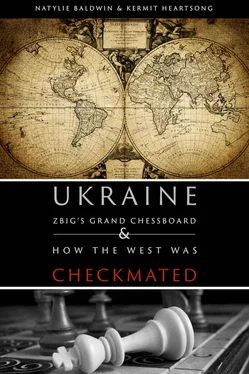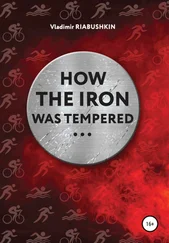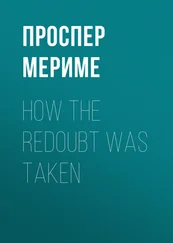Kermit Heartsong - Ukraine - ZBIG's Grand Chess Board & How The West Was Checkmated
Здесь есть возможность читать онлайн «Kermit Heartsong - Ukraine - ZBIG's Grand Chess Board & How The West Was Checkmated» весь текст электронной книги совершенно бесплатно (целиком полную версию без сокращений). В некоторых случаях можно слушать аудио, скачать через торрент в формате fb2 и присутствует краткое содержание. Год выпуска: 2015, Жанр: Политика, на английском языке. Описание произведения, (предисловие) а так же отзывы посетителей доступны на портале библиотеки ЛибКат.
- Название:Ukraine: ZBIG's Grand Chess Board & How The West Was Checkmated
- Автор:
- Жанр:
- Год:2015
- ISBN:нет данных
- Рейтинг книги:4 / 5. Голосов: 1
-
Избранное:Добавить в избранное
- Отзывы:
-
Ваша оценка:
- 80
- 1
- 2
- 3
- 4
- 5
Ukraine: ZBIG's Grand Chess Board & How The West Was Checkmated: краткое содержание, описание и аннотация
Предлагаем к чтению аннотацию, описание, краткое содержание или предисловие (зависит от того, что написал сам автор книги «Ukraine: ZBIG's Grand Chess Board & How The West Was Checkmated»). Если вы не нашли необходимую информацию о книге — напишите в комментариях, мы постараемся отыскать её.
Ukraine: ZBIG's Grand Chess Board & How The West Was Checkmated — читать онлайн бесплатно полную книгу (весь текст) целиком
Ниже представлен текст книги, разбитый по страницам. Система сохранения места последней прочитанной страницы, позволяет с удобством читать онлайн бесплатно книгу «Ukraine: ZBIG's Grand Chess Board & How The West Was Checkmated», без необходимости каждый раз заново искать на чём Вы остановились. Поставьте закладку, и сможете в любой момент перейти на страницу, на которой закончили чтение.
Интервал:
Закладка:


the Ukraine map—2015

Part I
The opening repertoire & beyond
Natylie Baldwin
You don’t get to be a serious person in Washington until you are considered pro-intervention.
— Mike Lofgren, legislative defense analyst
chapter 1
the end of the cold war
lost opportunities
Conditions in the Soviet Union
Leading to End of Cold War and Dissolution of USSR
By the time Mikhail Gorbachev took over leadership of the Soviet Union in 1985, the Cold War was in the midst of a deep freeze due to a period of poor diplomacy and major distrust on the part of the so-called Superpowers. The economic effects of the Cold War and the arms race it necessitated was having negative consequences for both the Soviet Union and the United States. However, the Soviet Union was more adversely affected and facing diminished economic growth as well as stunted technological development and modernization because of its heavy investment in the defense industry, which had enjoyed priority status within the Soviet economy from the late 1920's (Matlock 2010; Cooper 1991).
The Soviet Union was also in the midst of a guerrilla war in Afghanistan which added to the economic burden and reduced morale. Gorbachev recognized that negotiating an end to the Afghanistan war and the Cold War would enable him to implement reforms by parlaying the money invested in the arms race and militarization into civilian development as well as freeing the nation from the distraction of conflict (Cohen 2011; Matlock 2010).
However, it would be very misleading to assert that the eventual dismantling of the Soviet Union was only due to militarization. In terms of the Reagan administration's increased defense budgets, particularly in hi-tech sectors of defense, it would have been difficult for the Soviets to respond right away due to the their 11th Five-Year Plan (1980–1985) that was already in place and would have required a lengthy undertaking to change. Alternatively, the 12th Five-Year Plan, beginning in 1986, did not reflect any of the changes one would expect in response to these US defense policies. There is no substantive evidence that the USSR did significantly change economic policy in relation to military spending during this period. In fact, changes in defense spending were not seen until 1988 and then it was in the form of reductions (Reynolds 2011; Cooper 1991).
Another element that would be crucial in determining the continued viability of the Soviet economic system was energy. As energy economics expert, Douglas B. Reynolds explains, the Soviet economy up to that time had competed reasonably well with the West, despite its technological lag, lower productivity and the absence of officially sanctioned markets. This is because it was largely cheap fossil fuel energy that had accounted for much of the world's post-war growth. Both the US and the USSR had significant fossil fuel resources until each reached a peak in 1970 and 1988, respectively (Reynolds 2011).
By 1977, the CIA had deduced that the Soviet Union was approaching a peak in their oil production capacity and predicted that the peak would occur by the early 1980's, leading to shortfalls for domestic needs as well as an inability to fulfill supply obligations to its Eastern European satellites and to maintain sales of oil and gas to the West that provided 40 percent of the Soviet Unions’ hard currency earnings (CIA Memorandum; Schweizer 1994).
CIA Director William Casey, whom colleagues said viewed the Cold War rivalry with the Soviet Union as a continuation of the good versus evil fight against totalitarianism represented by Hitler's Germany, had presented Reagan in early 1981 with intelligence that reportedly detailed the economic vulnerabilities of the Soviet Union, particularly those relating to oil and gas.
A program was formulated to use intensified covert operations and economic warfare to undermine the Soviet Union. The program included the following parts: 1) increased support for the Solidarity movement in Poland, 2) increased financial and military support to the Afghan Mujahedeen, 3) increased psychological operations, 4) blocking of Soviet access to advance technology, and 5) reduction of Soviet hard currency earnings by driving down the price of oil in collusion with Saudi Arabia while limiting its oil and natural gas exports to Western Europe.
The program was officially given the green light via the signing of several National Security Decision Directives (NSDD) by President Reagan administration throughout 1982.
However, Casey had already begun having meetings in 1981 with officials from Saudi Arabia, which accounted for 40 percent of OPEC's oil production at the time. A deal was gradually worked out with the Saudi royal family, who were strict anti-communists and feared growing Soviet influence in the region, whereby the US would provide defense guarantees to the regime, including the sale of military weapons, in exchange for lower oil prices that would not only weaken the Soviet Union but would have the ancillary benefit of aiding the American economy. Defense Secretary Caspar Weinberger also played a significant role in bringing the deal to fruition (Schweizer 1994).
Indeed, a sharp decrease in oil prices followed, from $66 per barrel in 1980 to $20 per barrel by 1986. It should be noted that, according to a 1983 Treasury Department study, $20 per barrel was viewed as the “optimum” oil price for the American economy. The drop in oil prices was due to a Saudi-induced oil glut which, combined with diplomatic pressure exerted on western European nations, such as France, to curb imports of Soviet oil and natural gas, created a budgetary crisis in the Soviet Union (Sakwa 2012; Schweizer 1994).
As Reynolds (2011) reiterates, American and Saudi policies did not cause the collapse of the Soviet Union but represented a conscious decision to exacerbate an already existing problem of energy depletion within a relatively closed and rigid system. 1This contributed to the economic and political downward spiral of the Soviet Union by ensuring that it could not procure better technology to alleviate the crisis, consequently creating hard currency and budgetary problems.
By 1987, pursuit of these policies had died off due to political pressures and divisions within the Reagan administration. Nonetheless, the administration was able to participate in the negotiation process with Gorbachev from a position of considerable strength (Schweizer 1994).
Reagan and Gorbachev
Rise to the Occasion
Although the Reagan administration presided over some abhorrent policies, Jack Matlock — who was the Soviet Affairs expert on Reagan's National Security Council and later ambassador to the Soviet Union — makes a convincing case that Reagan was sincere in his desire to significantly reduce nuclear weapons and to ultimately end the Cold War. However, due to the aforementioned policies during his first term, he understandably hit a brick wall with Soviet Premiers Brezhnev, Andropov, and Chernenko (Matlock 2010).
Suzanne Massie, an author and professor of Russian Studies who specialized in Russian cultural history and served as an advisor to Reagan during his second term, confirms Reagan's sincerity despite the nature of the implemented policies. Her path to advisor status began in the autumn of 1983 when a high-ranking Soviet official warned her during a visit, “You don't know how close war is.” Alarmed, she became determined to get President Reagan's ear. She first had to go through National Security Advisor, Robert MacFarlane, who was able to get the White House to agree to send Massie on a “back channel” mission in January of 1984 to explore the Soviet leadership's willingness to negotiate on several key issues, utilizing her established rapport with some officials there.
Читать дальшеИнтервал:
Закладка:
Похожие книги на «Ukraine: ZBIG's Grand Chess Board & How The West Was Checkmated»
Представляем Вашему вниманию похожие книги на «Ukraine: ZBIG's Grand Chess Board & How The West Was Checkmated» списком для выбора. Мы отобрали схожую по названию и смыслу литературу в надежде предоставить читателям больше вариантов отыскать новые, интересные, ещё непрочитанные произведения.
Обсуждение, отзывы о книге «Ukraine: ZBIG's Grand Chess Board & How The West Was Checkmated» и просто собственные мнения читателей. Оставьте ваши комментарии, напишите, что Вы думаете о произведении, его смысле или главных героях. Укажите что конкретно понравилось, а что нет, и почему Вы так считаете.











